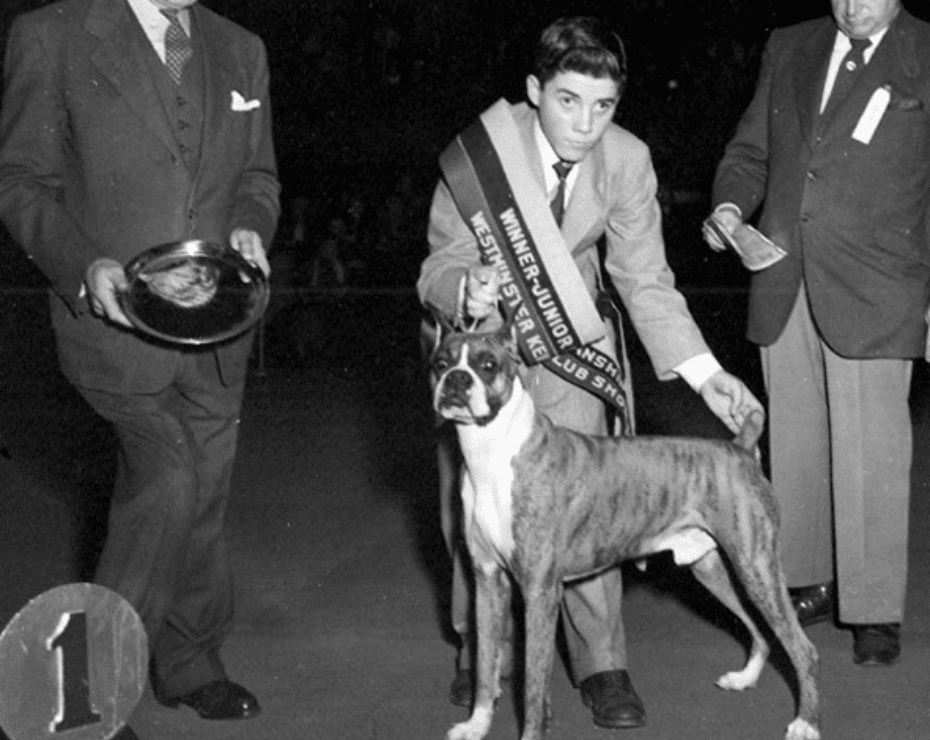JUNIOR SHOWMANSHIP
Where Are They Now
Since 1934, The Westminster Kennel Club has bestowed the title of Best Junior Handler to one deserving recipient. These talented handlers, who are between the ages of 9-18, come from all across the country to be judged on their dog handling skills, with eight advancing to the finals competition. These dedicated dog lovers spend countless hours training, grooming, and perfecting their ring techniques throughout the year to qualify for a chance to show at Westminster. Each year, approximately 100 qualified Juniors make their way to New York City for the most prestigious junior handling competition in the sport. The Westminster Kennel Club congratulates these Juniors for their continued involvement and future success in the sport of showing dogs and beyond.
1954 WESTMINSTER BEST JUNIOR HANDLER
GEORGE ALSTON
How did you become involved in showing dogs? I was a Virginia farm boy and my family raised Boxers. They started showing dogs to keep me from playing contact sports because I am blind in one eye from birth. When I qualified for the Garden, my Father drove me to New York City. We were in a pickup truck with my Boxer, “Boomer,” – CH Barmere’s Talisman sitting beside me. This was my first time ever in New York, of course, I was awestruck. As kids can do, they can be rather cruel. I was one of the few people not from the New York area that was there and I had a southern accent so thick that you could cut it with a knife, being from Virginia. So, I was just a southern good ole boy. They made fun of my accent. I had my brand new suit, right out of the catalog, brand new catalog tie, shirt, and shoes. The suit did not fit very well, and they made fun of me for that also, but I never said a word. I learned, at that point that you win by actions and not by your words. I conducted my whole career that way. People would say, “You can’t win this, you can’t win that” I wasn’t supposed to win a lot of things.

Describe what you remember from showing in the Junior Showmanship Finals at WKC. What was your most noteworthy remembrance of the experience? There was a Pomeranian in the ring and my Boxer wanted to eat it! The Pomeranian, of course, was at the end of the line, so I turned my dog, Boomer, around backward and let him bait off of the Pomeranian. I made that up myself, or otherwise, I could not control him. I aimed him at the Pomeranian, and he had his ears up, up on his toes and looked like a million dollars. I won that sucker.
What were your most memorable moments about showing at The Garden? There were 47 in the class, they did it all at once, they did not break it down. It was done in between the breed judging and the groups. My judge was Mr. Hollace Wilson, a golden retriever handler from Wisconsin. Nobody knew who I was, I was just a farm boy that talked funny from Virginia. To me, Westminster was just another dog show because I did not know any better. So, I was not nervous. I’ve never been nervous in the show ring, ever. Probably, the kids that were picking on me calmed me down and made me think, “Go ahead and talk and I’m gonna beat ya!” Don’t pick on southern boys that talk funny. They put my Westminster Best Junior Handler photo in every dog show catalog across the country in 1954. That’s when I found out that winning at WKC was a big deal. Walter Fletcher, the dog show writer for the New York Times, interviewed me right after the win. It was about then too that I realized going Best Junior at Westminster was a big deal. But I did not go into the junior ring thinking it was big deal.
How long had you and your dog been showing together before the Garden? I would say about two years, maybe two and a half years. He was purchased from Barmere’s Kennel in California and was out of Bangaways first litters and was his first champion. As I kid I worked for Nate Levine that showed “Bang Away,” CH. Bang Away of Sirrah Crest. I actually got to groom Bang Away and Nate Levine taught me a lot about handling. It was Nate Levine that taught me to concentrate on your dog, and have fisheye vision for everything that goes on in the ring at the same time. So you watch your competition, but you concentrate on your dog. This is something I’ve taught in my handling classes. You have to have fisheye vision so you know everything that your competition is doing, but you have to have single vision on your dog. I also worked in the kennel of Gordon Barton, he had a boarding kennel near where I lived. He was a professional handler who showed Boomer and finished him.
How has winning BJH affected your career? How has it affected your love of showing dogs? It started it. It was after I won Juniors at Westminster that I decided I wanted to be a Professional Dog Handler. I had swimming scholarships and two merit scholarships to colleges across the United States. I turned them down to work for $25 a week for Lina Basquette. I ended up apprenticing for 12 years for Professional Handlers. One year with Ms. Basquette, three years with Jane and Bob Forsyth, two years with Art Banes, and six years with Bill Trainor. So in total, I put in 12 years before showing dogs on my own.
What did you do after winning BJH? How did you celebrate your win? Well, we stayed in New York City overnight and went to an old German restaurant and I had sauerkraut for the first time. I still remember the taste of that sauerkraut and red cabbage! But other than that, that was the only celebration. To my Father, it was no big deal, it was just another dog show.
What do you view to be your contribution to the sport of Junior Showmanship? As a teacher. My seminars, my advice, and teaching juniors. I loved to have juniors in my handling classes. They were like sponges, they just wanted to absorb everything you said. All kids are like that. I want to be remembered not as a handler, because it was my dogs that did the winning, not me. All I did was guide them. I want to go down as being the greatest teacher that ever walked. I probably contributed to more kids in their handling, than any one single person. I probably saw, in my prime of teaching more than 2,000 people a year in my seminars. Melbourne Downing came to me and said, “George why aren’t you judging?” and I said well for two reasons, first and foremost when my wife and I were handling- I got to be the star. She was the wind beneath my wings. Now that we have retired from showing, she’s judging and I’m the wind beneath her wings. Then I said to ” Melbourne, you judged 43 Irish setters today. Could you ever improve any one of those dogs?” He said “No.” I said “I will take a class of 40 students, and I can improve every single one of those folks. That’s why I am a teacher. That’s a funny way of looking at it.” Now here’s another thing, when I pass on, I want played in my services, “I Did It My Way” by Frank Sinatra.
How would you compare your BJH win to your Group Wins at WKC? When I won Juniors, I won. That’s the only thing I’ve ever won. There are only two things I have ever won, number one was Best Junior at The Garden, the other being voted into the Professional Handlers Association Hall of Fame. I did that. The group at the Garden and every single Best in Show – the dog won, I didn’t win. The dog won. You didn’t win Best in Show, your dog did. People do not think of it that way. Best Junior I won because I did it. Every other win I had as a professional, the dog won. I taught that in my seminar. It takes the “me” out of showing dogs, if it wasn’t for the dog you wouldn’t be there.
You won BJH at WKC 65 years ago, what would you want to tell an up and coming Junior Handler that is just starting out in the sport? Learn from a professional handler, but not at a dog show. All of my assistants that I had besides one, were college graduates. They had to be at least 16 years old to work in the boarding kennel, and at least 21 years old to be my show assistant. The people working in my boarding kennel had to have an A average in school, I got to see their report cards before their parents saw them. If they got anything below a B, they were let go until the next report period. Five of my boarding kennel assistants that worked for me are veterinarians, two are professors at colleges, three of them became doctors, one a brain surgeon.
Five of your students have gone on to win Best in Show at the WKC Dog Show, and more than 15 of them have won the group at WKC, to what do you attribute their success? I would contribute their success from learning from the ground up. I would not let an assistant come on the road with me to a dog show unless they worked at least a year in my boarding kennel. I wanted them to learn first aid for dogs, learn conditioning, grooming and training dogs before they went to a dog show. I wanted to see how they reacted under pressure because at a dog show you are under pressure. You have to learn from the ground up.
What do you think about the overall evolution of Junior Showmanship at All-Breed Dog Shows? I was instrumental in getting professional handlers to be judges of Juniors. In my day, only Professional Handlers were Junior judges. Whatever handler that was free at a show would judge Juniors. The parents were not as involved as they were now. When I was showing in Juniors, the handler was there to look at the dog and how the dog looked. Not to judge the dog. If it was an ugly dog, did the Junior make it look half ugly?

